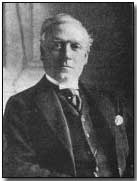Who's Who - Herbert Asquith
 Herbert Henry Asquith (1852-1928) was
born in Morley in Yorkshire on 12 September 1852. Of a middle-class family,
Asquith attended Balliol College, Oxford and then became a barrister in
1876, in London.
Herbert Henry Asquith (1852-1928) was
born in Morley in Yorkshire on 12 September 1852. Of a middle-class family,
Asquith attended Balliol College, Oxford and then became a barrister in
1876, in London.
He was elected to Parliament ten years later, in 1886, as a Liberal representing East Fife.
Asquith served as Home Secretary from 1892-95 in Gladstone's last ministry. During the Second Boer War (1899-1902) Asquith spoke out in favour of the war, one of the so-called Liberal imperialists. He was less popular as a vocal opponent of women's suffrage.
Asquith was an outspoken advocate of free trade, a policy that was to greatly assist in the Liberal party's return to power in 1905, where he served as Chancellor of the Exchequer under Henry Campbell-Bannerman, and succeeding him as Prime Minister in 1908. During his tenure as Chancellor many of his public addresses were attended by Suffragist protestors, who complained that whilst Asquith was responsible for determining how much women were to be taxed, he denied them representation at the same time: taxation without representation.
Asquith's government from 1908 until the outbreak of war is best known for its ambitious social welfare legislation, which including provisions for old age pensions in 1908, and unemployment insurance in 1911.
In the years immediately before the First World War, the Liberal government embarked upon a process of rearmament for the Royal Navy, a task necessitated by Germany's growing investment in its naval forces.
In order to finance both of the above, Asquith - and his Chancellor, David Lloyd George - enacted a radical Budget that increased land taxes, among other provisions. The Conservative-dominated House of Lords - the upper chamber - provoked a constitutional crisis by rejecting the finance bill, leading Asquith to threaten to flood the Lords with new Liberal peers so as to secure passage of the Budget, unless the peers dropped their opposition to the Budget.
After winning two consecutive General Elections, in January and December 10, held over the issue, Asquith passed the Parliament Act of 1911, which drastically cut back the powers of the upper chamber, and limited its ability to reject government finance bills.
In 1912 Asquith renewed Liberal efforts to establish Irish home rule, a policy that infuriated Protestants in Ulster, a protest that was supported by the government's Conservative opposition. On the brink of Irish civil war, the government was saved by an unlikely source: the outbreak of the First World War, which delayed the inevitable in Ireland.
Asquith proved an unsuccessful wartime leader. He formed a coalition government in May 1915 but was considered ill-fit for the task by elements within his own party as well as within the Conservative party. David Lloyd George plotted with the Conservatives to bring about Asquith's downfall, a decision that split the Liberal party. Asquith resigned on 5 December 1916; Lloyd George succeeded him on 7 December.
Despite losing his East Fife seat at the 1918 General Election, Asquith remained leader of the Liberal party until 1926; that is, among those Liberals who did not support Lloyd George's coalition government. Support for the Liberals was dwindling, and never recovered. Returned to Parliament at the 1923 election, where he represented Paisley, Asquith was raised to the peerage in 1925 as the Earl of Oxford.
In 1926 Lloyd George succeeded him as leader of the Liberals, although he never again entered government.
Herbert Henry Asquith died on 15 February 1928 in Berkshire.
A 'corkscrew' was a metal post for supporting a wire entanglement, with a twisted base enabling it to be screwed into the ground, removing the need for a hammer, the use of which could attract enemy fire.
- Did you know?
